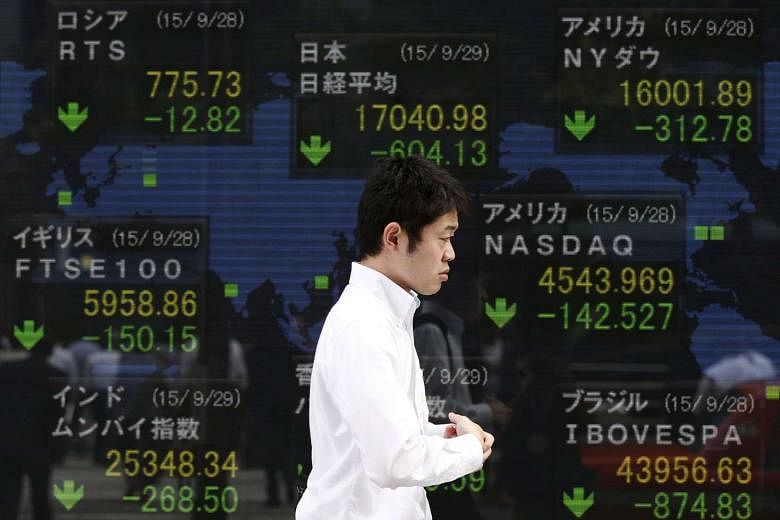SINGAPORE - Risk aversion sent bourses across Asia including Singapore into the red on Monday (Nov 16) following a weak Wall Street lead and news of deadly terrorist attacks that killed more than 130 people in Paris.
The risk-averse mood was also stoked by data on Monday that showed Japan's economy slipped back into recession in the third quarter.
China's announcement on Friday of plans to raise margin requirements also took their toll on Chinese equities.
As of 1.20 pm local time, Singapore slipped 1.12 per cent, Hong Kong was down 1.5 per cent, Shanghai dropped 0.43 per cent, and South Korea fell 1.19 per cent.
Japan's Nikkei index was down 0.9 per cent, after falling nearly 1.3 per cent in the morning. Data released before the Tokyo market opened showed that the world's third-largest economy contracted at a 0.8 per cent annualised rate in the July-September quarter, compared with the 0.2 per cent median estimate of analysts polled by Reuters.
The widely tracked CBOE volatility index or "fear gauge" was at its highest level since Oct 2.
European bourses are expected to open sharply lower today, with the London FTSE index is set to open 1.8 per cent lower, the German DAX down 2 per cent and the French CAC seen losing nearly 4 per cent, according to IG.
"If the governments step up on the war against terror, that could hit market sentiment, and may be more negative for risk assets such as equities. Investors may move to safe haven investments like bonds, USD and yen," IG market strategist Bernard Aw said.
The euro and emeging currencies fell in Asia on Monday as investors shifted to the safe-havens of US government bonds, Japanese yen and gold.
"Futures are pointing down for European and American markets, although we did see this pull back somewhat as trade progressed throughout the day. All indications are that these negative moves would only be temporary and are likely to dissipate over the coming days," IG market analyst Angus Nicholson said.
"The bigger question is whether this will see an escalation of the conflict in Syria and Iraq. French President François Hollande has publicly called the attacks an "act of war" and we have already seen a retaliatory bombing of the ISIS stronghold of Raqqa on Sunday by the French.
"The big question is whether France will decide to invoke Article 5 of the NATO treaty - the self-defense clause - which could see a significantly expanded presence of Western forces in Syria and Iraq," Mr Nicholson said.


